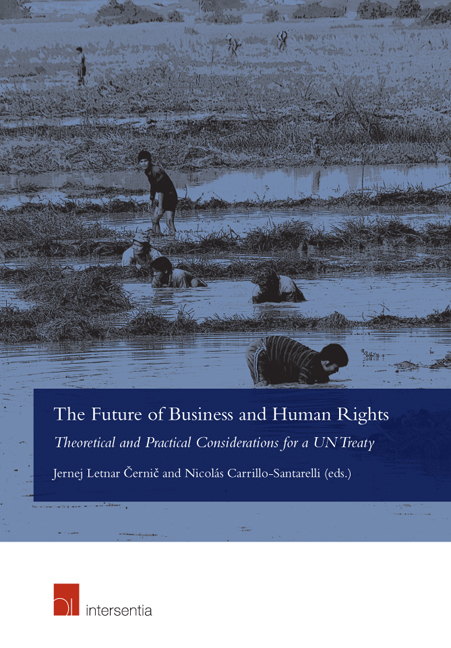Book contents
- Frontmatter
- Dedication
- Acknowledgements
- Contents
- About the Contributors
- Introduction
- Part I The Convenience and Possibility of Adopting a Treaty on Business and Human Rights
- Alternative Paths to a Business and Human Rights Treaty
- A Defence of Direct International Human Rights Obligations of (All) Corporations
- A Treaty on Business and Human Rights: Problems and Prospects
- Part II Critical Analyses Of A Treaty On Business And Human Rights
- Part III Regional Approaches
- PART IV Lessons from other Regimes of International Law
- Conclusion
- Index
A Treaty on Business and Human Rights: Problems and Prospects
from Part I - The Convenience and Possibility of Adopting a Treaty on Business and Human Rights
Published online by Cambridge University Press: 11 October 2018
- Frontmatter
- Dedication
- Acknowledgements
- Contents
- About the Contributors
- Introduction
- Part I The Convenience and Possibility of Adopting a Treaty on Business and Human Rights
- Alternative Paths to a Business and Human Rights Treaty
- A Defence of Direct International Human Rights Obligations of (All) Corporations
- A Treaty on Business and Human Rights: Problems and Prospects
- Part II Critical Analyses Of A Treaty On Business And Human Rights
- Part III Regional Approaches
- PART IV Lessons from other Regimes of International Law
- Conclusion
- Index
Summary
INTRODUCTION: MOVING THE BUSINESS AND HUMAN RIGHTS AGENDA FORWARD
The dismissal of the UN Norms in 2003 and the subsequent adoption of the UN Guiding Principles on Business and Human Rights (hereinafter, GPs) did not end calls for an international binding instrument in the area of business and human rights. Quite the contrary, the revival of the international debate on business and human rights, spurred by the successful mandate of the Special Representative of the Secretary-General on human rights and transnational corporations and other business enterprises (hereinafter, SRSG), constituted a springboard for those sectors of international civil society and of the community of States advocating for legally binding solutions.
Thus, in 2014, three years after having adopted the GPs, the Human Rights Council was faced with the initiative, led by the government of Ecuador, to promote the adoption of an international treaty. The process started with a 2013 declaration in which Ecuador, speaking for a number of countries that had rallied around the proposal, put forward the idea to the UN Human Rights Council (HRC) that the UN should start working on the drafting of a binding instrument. The declaration made clear that for the proposing States, while the GPs were a welcome progress, they were nothing more than a ‘first’ step, incapable of triggering concrete changes in the absence of a binding instrument clarifying ‘the obligations of transnational corporations’ and providing ‘for the establishment of effective remedies for victims in cases where domestic jurisdiction is clearly unable to prosecute effectively those companies’. This joint position was translated into a formal proposal at the 26th session of the HRC through a resolution drafted by Ecuador and South Africa and signed by Bolivia, Cuba and Venezuela, which was finally adopted on 26 June 2014. In the resolution it was decided:
… to establish an open-ended intergovernmental working group on a legally binding instrument on transnational corporations and other business enterprises with respect to human rights, the mandate of which shall be to elaborate an international legally binding instrument to regulate, in international human rights law, the activities of transnational corporations and other business enterprises.
The content, scope, nature and form of the future international instrument were left to be discussed at the first two sessions of the new working group.
- Type
- Chapter
- Information
- The Future of Business and Human RightsTheoretical and Practical Considerations for a UN Treaty, pp. 63 - 86Publisher: IntersentiaPrint publication year: 2018
- 6
- Cited by



